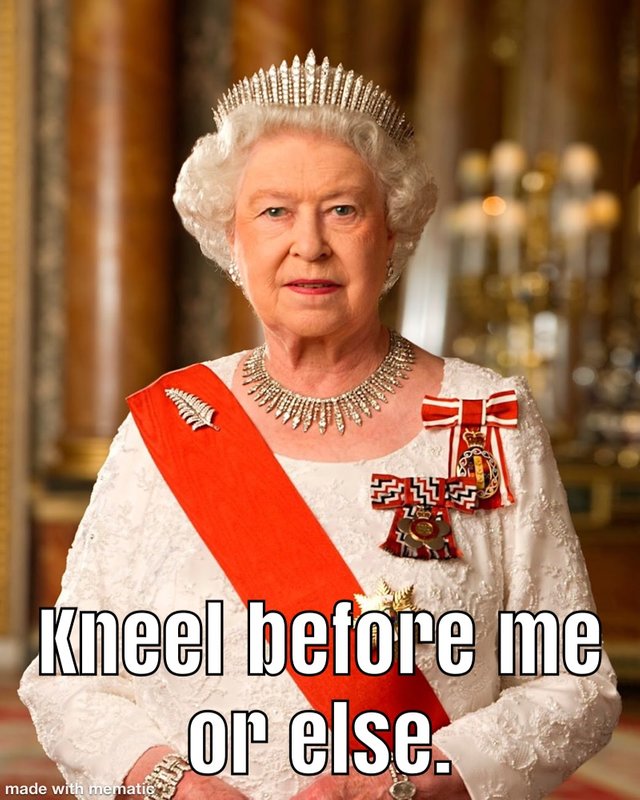Scotland's Pledge of Allegiance needs to change big time
Us Scots, if we are to push secession in favour of the interest of independence and sovereignty into the open, need to take a closer look into how exactly we can achieve it. It is right and just that we are against unelected elites such as the monarchy but one question seriously needs to be asked in these interesting times: why on earth are our duly elected MSPs forced by law to swear allegiance to certain elites that (and probably would in an independent Scotland if they were the head of state) have the final say on every law passed even on our own soil and be the main ones opening our parliament in Edinburgh? Even worse, why is it that our duly elected members of parliament can be legally banished from serving in office if they refuse to take up the oath? This oath only pledges allegiance to none other than Queen Elizabeth II and the rest of the British Royal Family as shown below:
"I (Member's Name), do solemnly, sincerely and truly declare and affirm that I will be faithful and bear true allegiance to Her Majesty Queen Elizabeth, Her Heirs and Successors, according to Law."
Are you taking note that NOT ONCE does this oath ever refer to the Scottish people? Why? Because according to the oath when taken literally, they have to tow the line of what the unelected elites in society tell them. You’d have to have been living under a rock for only God would know how long to notice that it’s no wonder our politicians very rarely serve the people that elected them in the first place.
As you dig further down the rabbit hole, you’ll find that this oath is linked with section 84 of the Scotland Act 1998 as follows:
Oaths.
(1) A person who is returned as a member of the Parliament shall take the oath of allegiance (whether or not he has taken the oath after being returned on a previous occasion or otherwise than as a member of the Parliament).
(2) He shall do so at a meeting of the Parliament and shall not take part in any other proceedings of the Parliament until he has done so.
(3) If he has not done so within the period of two months beginning with the day on which he was returned, or such longer period as the Parliament may have allowed before the end of that period, he shall cease to be a member of the Parliament (so that his seat is vacant).
(4)Each member of the [F1 Scottish Government] shall on appointment —
(a) take the official oath in the form provided by the M1Promissory Oaths Act 1868,
and
(b) take the oath of allegiance.
(5) Each junior Scottish Minister shall on appointment take the oath of allegiance.
(6) Subsections (4) and (5) do not require a member of the Parliament to take the oath of allegiance again if he has already done so in compliance with his duty as a member.
(7) In this section, references to taking the oath of allegiance are to taking it in the form provided by the Promissory Oaths Act 1868.
Quite breathtaking, isn’t it? That is until you go further down the hole to find the oath originally written in the year 1868 at the time when Queen Victoria was in power of the British Empire. It went in section 2 of the said act as follows: “I, , do swear that I will be faithful and bear true allegiance to Her Majesty Queen Victoria, her heirs and successors, according to law. So help me God.” This nearly also applies to sections 3 and 4 of the Promissory Oaths Act 1868 to the shortened official oath and even to the judicial system, which the latter‘s extended version ironically refers to upholding her majesty’s laws “without fear or favour, affection or illwill. So help me God.” Not good if her majesty breaks the law and the public wants her held to account just like the rest of us!
This is why much of Section 84 of the Scotland Act 1998 needs to be amended to greatly reflect the devolution that Scotland so deserves to be granted. One solution would be to remove subsection 7 of the said Act and then amend subsection 4(a) to reflect the source of a new Scottish Oath of Allegiance which shall state the following:
"I (member’s name here) do solemnly, sincerely, and truly declare and affirm that I will defend the freedom and democracy of Scotland against all enemies both foreign and domestic; and that I will be faithful and bear true allegiance to the people of Scotland and the electorate of Scotland according to law as I am about to enter office. So help me (insert name of God here)."
Only then will subsection 7 be reintroduced to reflect the new oath as a whole. That way the real oath of allegiance shall be with the people that so deserve to know what deed their elected officials made to reflect their promises to the electorate. It won’t be completely straightforward fixing the problem at first but at least it’ll be a good start.
If we the people were just left up to ourselves on what we should do on our own land, things will be just fine. After all, the process of devolution involves getting government into smaller units to promote more economic growth. The smaller it is, the generally less power it has to hobble free enterprise, especially small businesses, with taxes and regulations. Devolution should involve making it easier for individuals to use a currency of their choice instead of a centralised currency favoured by big banks and politicians. That is what will guarantee true peace, property and liberty.
Let’s really hope our MSPs do take up this offer soon.
